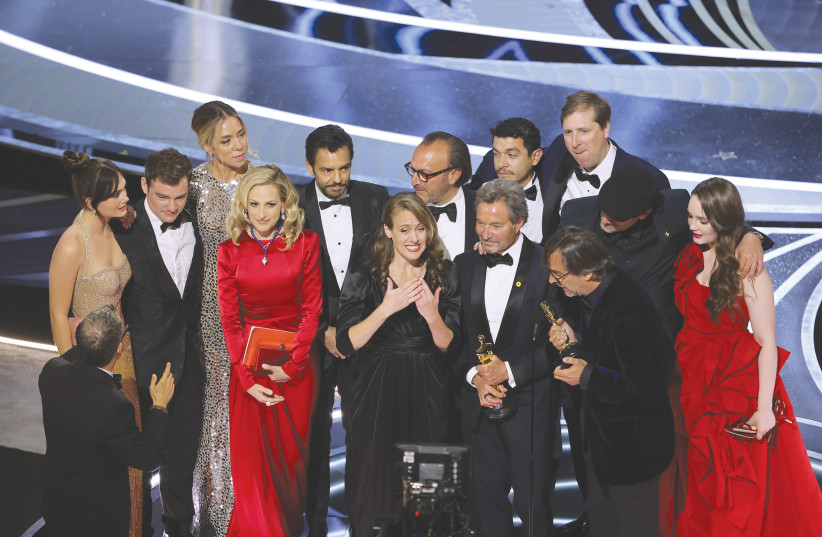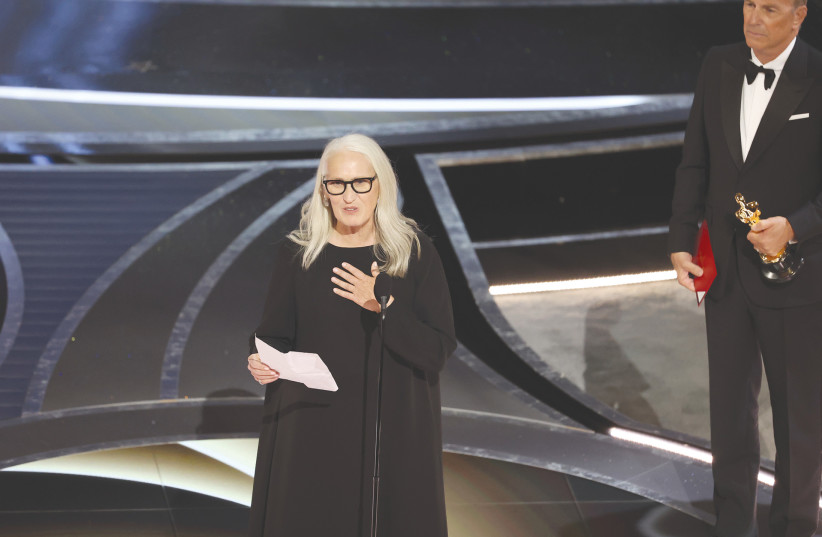Sometimes celebrities naively ask why we can’t all get along, but while some participants at the 94th Academy Awards referenced the war and suffering in Ukraine, Best Actor winner Will Smith got violent on live TV.
Smith, who won an Oscar for playing the domineering and volatile father of tennis stars Serena and Venus Williams in the movie King Richard soon afterwards, actually came up on stage and hit presenter Chris Rock for making a cruel joke about Jada Pinkett Smith, Smith’s wife.
Rock, who was presenting the award for Best Documentary (which was won by Questlove’s Summer of Soul) joked about couples where both partners are actors and ribbed Pinkett Smith, whose head was shaved and who suffers from alopecia, a disease that can cause hair loss, saying the actress and musician was starring in G.I. Jane 2, a movie in which Demi Moore shaved her head.
While Will Smith seemed to be laughing after the comment, he then stunned the audience by taking to the stage and slapping Rock in the face. “Wow,” said Rock. “Will Smith just smacked the s**t out of me.”
Smith’s comments were censored when he returned to his seat, but it was apparent that he told Rock, “Keep my wife’s name out your f***king mouth.” During the fracas, many broadcasters around the world – including in Israel – blacked out the screen for a minute.

Not long afterwards, Smith won his first Oscar in a victory many had predicted and took the stage, his eyes tearing up as he apologized to everyone – except Rock.
“Richard Williams was a fierce defender of his family,” Smith said, moments after the debacle.
“In this time in my life, in this moment, I am overwhelmed by what God is calling on me to do and be in this world... I’m being called on in my life to love people and to protect people and to be a river to my people.”
Throughout his career, he said he had ignored taunts. “You gotta smile you gotta pretend like that’s ok,” he said and credited fellow nominee, two-time Oscar winner Denzel Washington who was nominated for the lead role in The Tragedy of Macbeth, for telling him, “... at the highest moment, be careful – that’s when the devil comes for you. It’s like, I want to be a vessel for love.”
It was perhaps all to the good for the broadcast that the fisticuffs occurred, because they created a story other than the fact that ratings have been going down steadily for the Oscars in recent years.
This year, there were a number of controversies related to the broadcast, mainly over to the decision to give out about half of the awards – for categories including Best Editing and Best Score, deemed to be insufficiently important for television – in a separate ceremony that was not televised. Following an outcry, brief clips from these awards were shown. Rachel Zegler, the star of Steven Spielberg’s West Side Story, one of the most nominated films, was not invited to the broadcast at all, due to the fact that the audience this year was smaller than usual, because of COVID-19. Eventually, she was invited to present an award, leading many to wonder why she was not originally included among the presenters.
The biggest star in the world these days is not an actor or singer but a former comedian, Ukrainian President Volodymyr Zelensky, and it was rumored that he might make a video appearance on the show to speak about the war. Amy Schumer, who along with Regina Hall and Wanda Sykes, was one of the hosts of the show, floated the idea recently and two-time Best Actor winner Sean Penn, who went to Ukraine to film a documentary, said on Sunday that he would smelt his Oscars in public if Zelensky was not given a chance to speak. But in the end, Zelensky did not appear, although actress Mila Kunis, who has Ukrainian ancestors and has raised money to support Ukraine, referenced the struggles of the Ukrainian people against the Russian army in her Oscar appearance. There was also a moment of silence for Ukraine and director Francis Ford Coppola, who appeared with Robert De Niro and Al Pacino in a tribute to the 50th anniversary of the release of the original Godfather movie, said, “Viva Ukraine” at the end of his speech.
Other than the moment of violence and the calls for peace, this glacially paced Oscar telecast was one of the dullest ever, with the usual collection of unfunny comedy bits that dragged the broadcast to nearly four hours.
While the neo-Western, The Power of the Dog, that critiqued the toxic masculinity of which Smith’s behavior was a prime example, was expected to win big, instead a drama about the hearing daughter of a deaf family, CODA, from Apple TV +, became the first streaming-service movie to win Best Picture. In retrospect, the win for CODA couldn’t be more predictable. It is about a special-needs family, with authentic casting – Best Supporting Actor winner Troy Kotsur and costar Marlee Matlin are both actually deaf – and it is the feel-good story of an earthy working-class family, the kind of people who couldn’t be further removed from most Academy members and whom the Academy loves to celebrate. Kotsur’s heartfelt speech – delivered in sign language – was the most moving moment of the night. CODA director Sian Heder won for Best Adapted Screenplay.
Jane Campion did win Best Director for The Power of the Dog, becoming the third woman to win in this category.

As predicted, Ariana DeBose won Best Supporting Actress for West Side Story, making her the first performer to win an Oscar for a role in a remake for which the actor in the original film also won an Oscar, since Rita Moreno won this award as well. Jessica Chastain took Best Actress for The Eyes of Tammy Faye, a biopic about televangelist Tammy Faye Bakker.
Kenneth Branagh won the Best Original Screenplay Oscar for his semi-autobiographical film, Belfast. Drive My Car, a drama from Japan, won Best International Feature.
Pulp Fiction stars John Travolta, Uma Thurman and Samuel L. Jackson reunited on stage to present the Best Actor Oscar.
The Best Picture Award was presented by Liza Minnelli and Lady Gaga, with Gaga warmly supporting the wheelchair bound Minnelli, who starred in and won an Oscar for Cabaret, which, like The Godfather, was released 50 years ago.
Perhaps the brawl may have added a few ratings points to the broadcast, which was low on Jewish content this year. Coppola thanked his frequent collaborator, the late American-Jewish producer Robert Evans, but star Bob Saget was left out of the In Memoriam tribute, although American-Jewish movie producer Marcia Nasatir, the first woman to be vice president of a movie studio, was included.
